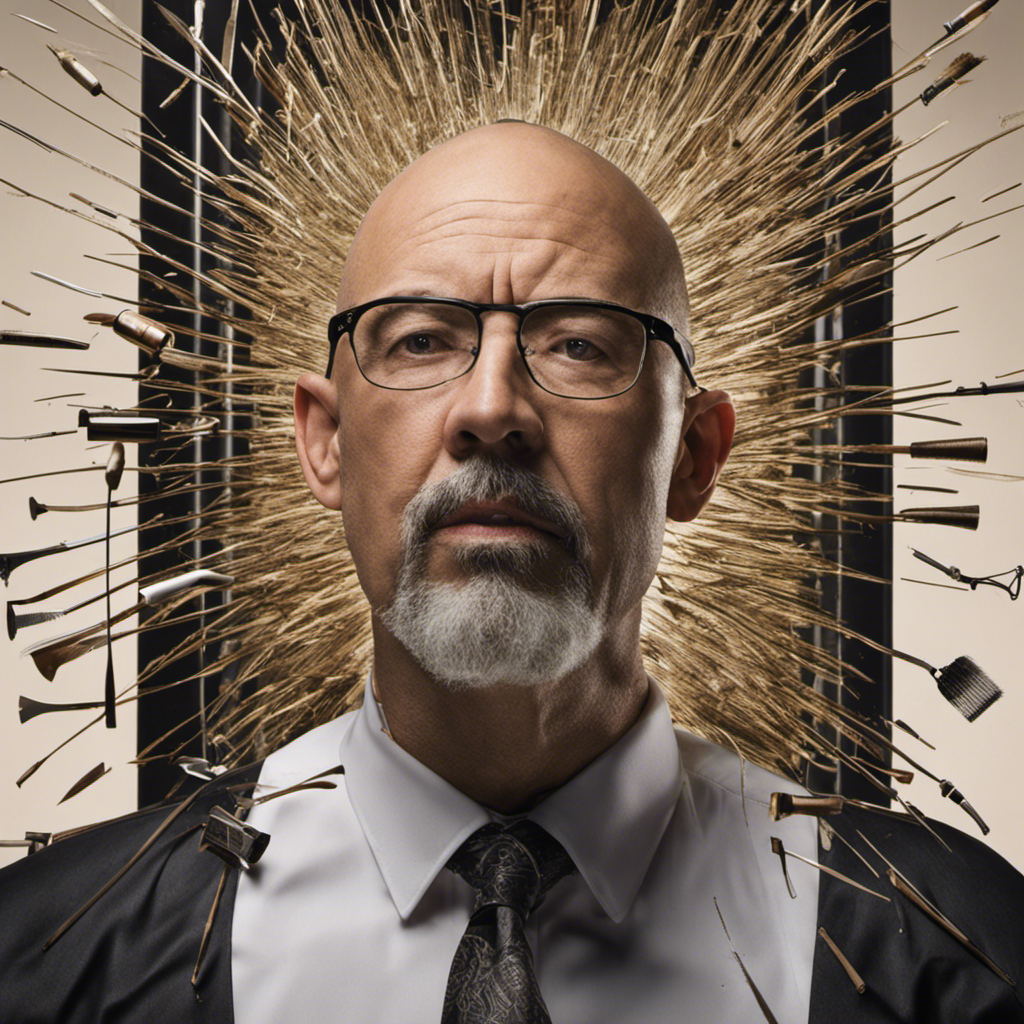Introduction to Shaving
What Does It Mean When You Shave Your Head in a

While shaving my head, I pondered the significance behind the act. Unbeknownst to me, this seemingly straightforward gesture held deep symbolic meaning.
Throughout history, shaved heads have held significance in various cultures, from signifying devotion and humility to representing a fresh start or rebellion.
Psychologically, shaving one’s head can be a form of self-expression or a way to take control over one’s appearance.
Join me as we delve into the fascinating world of shaved heads and uncover the personal motivations behind this transformative act.
Key Takeaways
- Shaving your head can signify surrender, humility, and devotion in many cultures and religions, but it can also represent rebellion, nonconformity, or a desire to break free from societal norms.
- Shaving one’s head has historical and religious significance, symbolizing a fresh start, rebirth, devotion, and renouncement of worldly desires.
- Shaved heads can have different meanings in different contexts, such as renouncing material possessions for Buddhist monks, symbolizing strength and resilience for cancer survivors, or representing extremist ideologies for certain groups.
- Shaving your head can have psychological motivations, including reclaiming control over appearance, self-expression, challenging beauty standards, and desiring a fresh start or change.
The Symbolic Meaning of Shaving Your Head
Shaving your head can have various symbolic meanings and is often seen as a bold statement. One of the most significant symbolic meanings of shaving one’s head is its spiritual significance. In many cultures and religions, shaving the head represents a sense of surrender, humility, and devotion to a higher power. It is a way to detach oneself from worldly attachments and focus on the spiritual journey.
However, shaving your head also carries social implications. In some societies, a shaved head can be associated with rebellion, nonconformity, or a desire to break free from societal norms. It can also be a sign of mourning or a way to show solidarity with a cause or community.
Moving forward, let’s explore the historical significance of shaved heads and how this practice has evolved over time.
Historical Significance of Shaved Heads
Throughout history, shaved heads have held various cultural and symbolic meanings.
In ancient traditions, shaving one’s head was often a ceremonial act, symbolizing a fresh start or rebirth. Religious practices also incorporated shaving the head as a way to signify devotion and humility.
For example, in Buddhism, monks shave their heads to renounce attachment to worldly possessions and focus on spiritual growth. In Hinduism, head shaving is a common practice during pilgrimage as a form of purification and sacrifice.
The act of shaving the head has played a significant role in these ancient traditions and religious practices, serving as a visual representation of one’s commitment to spiritual or personal transformation.
Understanding these historical significances provides a foundation for exploring the cultural interpretations of a shaved head in contemporary society.
Cultural Interpretations of a Shaved Head
In contemporary society, there are diverse cultural interpretations of having a shaved head. Cultural perceptions and societal norms play a significant role in shaping these interpretations.
Here are four examples of how a shaved head is viewed in different cultures:
-
Buddhist Monks: In Buddhism, shaving the head represents renunciation of worldly desires and attachment to material possessions. It symbolizes a commitment to a spiritual life and detachment from physical appearance.
-
Cancer Survivors: For individuals who have undergone chemotherapy or radiation treatments, shaving the head is a symbol of strength and resilience. It represents their journey through illness and serves as a reminder of their courage and determination.
-
Skinheads: Unfortunately, some extremist groups have adopted the shaved head as a symbol of their ideologies, often associated with racism and violence. This misinterpretation has led to negative stereotypes and stigmatization.
-
Fashion and Style: In the fashion industry, a shaved head can be seen as a bold and edgy statement. It challenges traditional beauty standards and embraces uniqueness and individuality.
It is important to recognize that cultural interpretations of a shaved head may vary, and it is crucial to understand the context and cultural background before making any assumptions.
Psychological Explanations for Shaving Your Head
Psychologists have identified various factors that contribute to individuals’ decision to shave their heads. One of the main reasons is the emotional impact that shaving one’s head can have. For some, it can be a way to reclaim control over their appearance in the face of hair loss or balding.
It can also be a form of self-expression, allowing individuals to break free from societal norms and expectations surrounding hair. Shaving one’s head can symbolize a fresh start or a desire for change. Additionally, it can be a way to challenge beauty standards and redefine what it means to be attractive.
Understanding the psychological motivations behind shaving your head can provide insight into the personal reasons people choose to take this bold step. Now, let’s explore the personal motivations behind shaving your head.
Personal Motivations Behind Shaving Your Head
One of the main reasons individuals choose to shave their heads is to reclaim control over their appearance in the face of hair loss or balding. Shaving my head allowed me to confront the underlying emotions and societal pressures associated with hair loss head-on.
Here are four key motivations behind shaving your head:
-
Confidence: Shaving my head helped me embrace my baldness and feel more confident in my own skin.
-
Simplicity: Maintaining a shaved head is much simpler and requires less time and effort than trying to conceal hair loss.
-
Empowerment: Shaving my head was a powerful way to take charge of my own appearance and challenge societal beauty standards.
-
Individuality: By choosing to shave my head, I was able to express my unique identity and not conform to societal expectations.
Frequently Asked Questions
How Long Does It Take for Hair to Grow Back After Shaving Your Head?
It typically takes about 6-12 months for hair to fully grow back after shaving your head. To maintain a shaved head, moisturize regularly, protect from the sun, and consider using a gentle exfoliating scrub.
Does Shaving Your Head Make Your Hair Grow Back Thicker?
Shaving my head doesn’t make my hair grow back thicker. It’s a common misconception. Shaving only affects the appearance and texture of the hair, not its growth rate or thickness.
Are There Any Health Risks or Benefits Associated With Shaving Your Head?
There can be both health risks and benefits associated with shaving your head. On one hand, it can increase the risk of sunburn and skin damage. On the other hand, it can be easier to maintain hygiene and may reduce the risk of lice infestation.
Can Shaving Your Head Help With Hair Loss or Thinning?
Shaving my head for hair loss has been like hitting the reset button. It can improve scalp health by exfoliating dead skin and promoting blood flow. Psychologically, it can boost confidence and help embrace a new look.
What Are Some Popular Hairstyles for People With Shaved Heads?
Popular hairstyles for people with shaved heads include the buzz cut and the bald fade. These styles are low-maintenance and can give a bold and edgy look. They are often chosen for practicality or as a fashion statement.
Conclusion
In conclusion, shaving your head can hold various symbolic meanings, historical significance, and cultural interpretations. It can also have psychological explanations and personal motivations behind it.
While some may argue that shaving your head is simply a fashion trend or a way to cope with hair loss, it is important to recognize that for many individuals, it is a powerful and intentional act that represents personal transformation, rebellion, or spiritual devotion.
Understanding the deeper meanings and motivations behind shaving one’s head can provide insight into the diverse ways in which individuals express themselves and find meaning in their lives.
Phoenix, aptly named for the mythical bird that rises from the ashes, embodies resilience, transformation, and growth – qualities that are palpably present in his writing for Head Shave Products. As a writer, Phoenix brings a fresh, rejuvenating perspective to the world of shaving, often unearthing stories and insights that are both transformative and enlightening.
Introduction to Shaving
When to Shave Your Head From Thinning Hair

Experiencing hair thinning firsthand has made me familiar with the emotions of uncertainty and self-consciousness that come with it.
But here’s the thing: shaving your head can be a liberating and empowering choice. Trust me, I’ve been there.
In this article, we’ll explore the signs of advanced hair thinning, the benefits of embracing the bald look, and the factors to consider before taking the plunge.
So, if you’re ready to reclaim your confidence and rock the bald look, stick around. You’re in good hands.
Key Takeaways
- Significant hair loss in certain areas can be a sign of advanced hair thinning.
- Treatment options for advanced hair thinning include medications, hair transplant surgery, and laser therapy.
- Shaving your head can provide a low-maintenance look, save time and money on hair products, and boost self-confidence.
- Factors to consider before shaving your head include personal style, maintenance preferences, and consultation with a dermatologist or hair loss specialist.
Signs of Advanced Hair Thinning
If you’re noticing significant hair loss in certain areas, it’s a sign of advanced hair thinning. Advanced hair loss occurs when the hair follicles shrink and produce thinner, weaker strands of hair. This can be caused by various factors such as genetics, hormonal changes, and certain medical conditions.
It’s important to address this issue early on to prevent further hair loss. There are several treatment options available for advanced hair loss, including medications like minoxidil and finasteride, hair transplant surgery, and laser therapy. These treatments aim to stimulate hair growth and improve the overall thickness and quality of the hair.
However, if these treatments are not effective or if you prefer a more immediate solution, shaving your head can be a viable option.
Benefits of Shaving Your Head
One of the benefits of shaving your head due to thinning hair is that it can give you a low-maintenance look. As someone who has experienced this firsthand, I can attest to the positive impact it can have on your self-confidence. Embracing baldness acceptance and taking the leap to shave my head was a game-changer for me. Not only did it save me time and money on hair products, but it also gave me a newfound sense of self-assurance. To illustrate the emotional journey of baldness acceptance and the self-confidence boost it can provide, take a look at the table below:
| Before Shaving | During Shaving | After Shaving |
|---|---|---|
| Insecurity | Nervousness | Empowerment |
| Hiding | Vulnerability | Liberation |
| Self-doubt | Curiosity | Confidence |
Shaving your head can be a transformative experience, allowing you to embrace your baldness and boost your self-confidence in the process.
Factors to Consider Before Shaving Your Head
Before making the decision to shave, it’s important to consider factors such as your personal style, maintenance preferences, and potential impact on your self-image.
When it comes to hair loss prevention, shaving your head is one alternative to explore. However, it’s essential to be aware of other alternative hair loss treatments as well.
While shaving your head may seem like a simple solution, it’s crucial to understand that it is not a guarantee for hair regrowth. Alternative hair loss treatments, such as medication, topical creams, and laser therapy, may offer different benefits and results.
It’s advisable to consult with a dermatologist or hair loss specialist to explore all available options. They can provide expert advice tailored to your specific situation and guide you in making an informed decision.
How to Know if Shaving Your Head Is the Right Choice
To determine if shaving is the right choice for you, take into account factors like your personal style, maintenance preferences, and how it may affect your self-image.
Shaving your head can have a significant psychological impact, as it is a visible change that may alter how you perceive yourself and how others perceive you. It is important to consider how comfortable you are with this change and how it aligns with your desired image.
Additionally, if you are experiencing thinning hair, exploring alternative hairstyles for thinning hair may be another option to consider before deciding to shave your head. Consulting with a hairstylist or barber who specializes in working with thinning hair can provide valuable insight and guidance in finding a hairstyle that suits you and boosts your confidence.
Embracing the Bald Look: Tips and Tricks
When embracing the bald look, remember to moisturize your scalp regularly to keep it healthy and hydrated. Rocking bald hairstyles can be a bold and confident choice, but it’s important to take care of your scalp to maintain a bald head.
Moisturizing your scalp helps prevent dryness, flakiness, and irritation. Look for a moisturizer specifically designed for the scalp and apply it daily or as needed. Additionally, make sure to protect your scalp from the sun by wearing a hat or using sunscreen.
Maintaining a bald head also involves regular cleansing to remove any buildup of dirt or oils. Use a gentle shampoo and conditioner to keep your scalp clean and fresh.
Lastly, remember to exfoliate your scalp occasionally to remove dead skin cells and promote healthy hair growth. Embracing the bald look can be a stylish and empowering choice, as long as you take care of your scalp.
Frequently Asked Questions
What Are Some Non-Surgical Options for Treating Thinning Hair?
I’ve found some effective non-surgical options for treating thinning hair. Natural remedies like essential oils and scalp massages can help stimulate hair growth. Another option is a hair transplant, which can provide long-lasting results.
Will Shaving My Head Make My Hair Grow Back Thicker?
Shaving your head does not prevent hair loss, but it can improve scalp health. However, it won’t make your hair grow back thicker. It’s important to consider other options for treating thinning hair.
Can I Still Style My Hair if I Shave My Head?
If you shave your head, you’ll have limited styling options. However, embracing a shaved head can boost your self-confidence and create a bold, sleek look. It’s a personal choice that can be empowering.
How Long Does It Take for a Shaved Head to Grow Back?
It typically takes about 6 months for a shaved head to grow back. During this time, it’s important to care for your scalp and protect it from the sun. As your hair grows, there are various hairstyles you can try for a stylish look.
Are There Any Health Risks Associated With Shaving Your Head?
There are a few health risks associated with shaving your head, such as potential cuts and irritations. To minimize these risks, it’s important to follow proper scalp care tips and take precautions when shaving your head.
Conclusion
After considering the signs of advanced hair thinning and the benefits of shaving my head, I have come to the conclusion that embracing the bald look is the right choice for me.
The thought of running my hand across my smooth scalp and feeling the freedom of the wind on my head is exhilarating. I am ready to let go of my thinning hair and embrace a new, confident version of myself.
With the right tips and tricks, I know I can rock the bald look with style and grace.
Lucy, with her knack for weaving words into compelling narratives, is a cherished member of our content team. Her journey into the world of content creation began with a love for storytelling, nurtured during evenings spent around campfires and family gatherings. These tales, filled with emotion and life lessons, left an indelible mark on her young mind, propelling her into the realm of writing.
Introduction to Shaving
When Can I Shave Baby Head

As a parent, I often wonder, “When is the best time to shave my baby’s head?” This is a question that many of us have, and for good reason. Understanding the developmental factors, the intricacies of infant hair growth, and the different cultural and traditional practices associated with this matter is crucial.
In this article, we’ll delve into age guidelines, offer tips for safe shaving, and explore personal preferences and decision-making. So, let’s journey together and discover the answers to this intriguing question.
Key Takeaways
- Developmental factors, such as waiting until baby’s head has fully developed and using gentle care, are important when considering shaving a baby’s head.
- Age guidelines can vary, but some babies may have enough hair to trim by 6 months and hair may be longer and require more maintenance by 1 year.
- Cultural and traditional practices surrounding shaving a baby’s head can vary, and it’s important to respect these practices while also considering modern perspectives and consulting healthcare professionals.
- Personal beliefs and societal norms can influence the decision to shave a baby’s head, so it’s important to consider your own values and what you believe is best for your baby.
Developmental Factors to Consider
You should wait until your baby’s head has fully developed before you can shave it. Understanding the hair growth stages and proper scalp care is crucial in ensuring your baby’s well-being.
During the first few months, your baby’s hair may be very fine, thin, and may even fall out. This is normal and part of their development. As your baby grows, their hair will start to thicken and become more noticeable. It’s important to take care of their scalp by regularly washing it with a gentle baby shampoo and using a soft brush or comb to prevent any tangles or discomfort.
However, it is generally recommended to avoid shaving your baby’s head until they are at least one year old, as their scalp is still delicate and developing. Patience and proper care will help your baby’s hair grow healthy and beautiful.
Understanding Hair Growth in Babies
Understanding hair growth in babies can vary from child to child, but it is a natural process that occurs at different rates. As a parent, it’s important to know how to take care of your baby’s hair and maintain their scalp health.
Baby hair is delicate and requires gentle care to prevent damage. Regular washing with a mild baby shampoo is recommended to keep the scalp clean and free from any buildup. It’s also important to avoid using harsh chemicals or hair products that may irritate your baby’s sensitive skin.
Massaging the scalp with a soft brush or your fingertips can help stimulate blood circulation and promote healthy hair growth. Remember, every baby is different, and their hair growth will follow its own unique timeline.
When it comes to shaving your baby’s head, there are specific age guidelines to consider.
Age Guidelines for Shaving Baby’s Head
The age guidelines for when it’s appropriate to trim a baby’s hair can vary depending on their individual development. It’s important to consider their developmental milestones and assess their hair care needs accordingly. Most babies are born with a thin layer of hair, and it gradually grows thicker and longer over time. By the age of 6 months, some babies may have enough hair to warrant a trim. However, it’s crucial to prioritize their safety and comfort during the process. To help you understand when it might be appropriate to trim your baby’s hair, here’s a table outlining some general guidelines:
| Age | Hair Growth |
|---|---|
| 6 months | Some babies may have enough hair to trim. |
| 1 year | Hair may be longer and require more maintenance. |
| 18 months | Hair may be thicker and more manageable. |
Tips for Safe Baby Head Shaving
When safely trimming a baby’s hair, it’s important to use gentle and controlled movements to ensure their comfort. Developmental milestones play a significant role in determining when it’s appropriate to trim a baby’s hair.
Most babies start growing hair within the first few months of their lives, and by around one year old, their hair may have grown significantly. To safely trim their hair, make sure you have sharp and clean scissors specifically designed for baby hair.
It’s important to choose a time when your baby is calm and relaxed, like after a bath or during nap time. Remember to trim small sections at a time, starting from the back and moving towards the front. Regularly moisturize your baby’s scalp to keep it healthy.
Transitioning to cultural and traditional practices, some cultures believe that shaving a baby’s head promotes hair growth and symbolizes purity.
Cultural and Traditional Practices
When it comes to the significance of baby head shaving, there are various cultural variations in practices that should be considered.
It is important to understand that these traditions hold deep meaning and historical significance for different communities around the world.
However, it is also essential to explore modern perspectives on tradition, taking into account the evolving societal norms and the potential impact on a baby’s well-being.
Significance of Baby Head Shaving
If you’re wondering about the significance of shaving a baby’s head, it is a cultural practice in some communities believed to promote healthy hair growth.
Cultural beliefs play a significant role in many aspects of our lives, including how we care for our children. In some cultures, shaving a baby’s head is believed to remove any negative energies or impurities and allow for the growth of strong and healthy hair.
While scientific research may not support these beliefs, they are deeply ingrained in the cultural traditions of these communities. It is important to approach this topic with compassion and understanding, recognizing that cultural practices and beliefs vary widely and should be respected.
Ultimately, the decision to shave a baby’s head is a personal one that should be made in consultation with trusted healthcare professionals.
Cultural Variations in Practices
In different cultures, the practice of shaving a baby’s head holds various cultural beliefs and symbolic rituals. It is fascinating to explore the cultural variations in these practices.
For instance, in some Indian communities, a baby’s head is shaved as part of a traditional ceremony called Mundan. It is believed to cleanse the child of any negativity and promote hair growth. The hair is then offered to a deity as a gratitude gesture.
In other cultures, like the Chinese, the first haircut is seen as a significant milestone. It symbolizes the child’s transition from infancy to childhood. The hair is often collected and kept as a token of good fortune.
Different communities have diverse reasons and rituals associated with shaving a baby’s head. It is through understanding these cultural beliefs that we can appreciate the richness and diversity of human traditions.
Modern Perspectives on Tradition
Contrary to traditional beliefs, modern perspectives on cultural practices often prioritize individual choice and personal expression. In today’s rapidly changing society, societal norms are evolving, and with them, our understanding of cultural preservation. While it is important to honor and respect our cultural heritage, it is equally crucial to adapt and embrace the changing times. This shift in perspective allows for a more inclusive and diverse society, where individuals are free to explore and express their own identities. The following table represents the changing societal norms and the importance of cultural preservation in modern times:
| Changing Societal Norms | Cultural Preservation | Individual Choice |
|---|---|---|
| Embracing diversity | Honoring traditions | Personal expression |
| Inclusivity | Cultural education | Freedom to explore |
Personal Preferences and Decision Making
You should consider your personal preferences and consult with a professional before deciding when to shave your baby’s head. When it comes to shaving a baby’s head, personal beliefs and societal norms play a significant role in decision making.
Here are some factors to consider:
- Cultural traditions: Some cultures believe that shaving a baby’s head promotes healthy hair growth and symbolizes new beginnings.
- Personal beliefs: Your own beliefs and values regarding hair care and grooming may influence your decision.
- Social acceptance: Consider societal norms and how shaving your baby’s head may be perceived by others.
Ultimately, the decision is yours to make. It is important to gather information, consult with professionals, and trust your instincts to ensure that you make the best choice for your baby and your family.
Frequently Asked Questions
Can Shaving a Baby’s Head Make Their Hair Grow Back Thicker and Fuller?
Shaving a baby’s head does not make their hair grow back thicker or fuller. This is a myth. However, some cultural practices involve shaving a baby’s head for various reasons, such as promoting hair growth or symbolizing a fresh start.
What Are the Potential Risks or Side Effects of Shaving a Baby’s Head?
Shaving a baby’s head can have potential risks and side effects. It is important to consider the sensitivity of their delicate scalp and the potential for irritation or injury.
Are There Any Specific Hair Care Products or Techniques Recommended After Shaving a Baby’s Head?
After shaving my baby’s head, I found that using gentle hair care products and techniques is essential. It’s important to choose mild shampoos and conditioners suitable for their delicate scalp, and to gently brush their hair to avoid any discomfort.
Can Shaving a Baby’s Head Help With Conditions Like Cradle Cap or Baby Dandruff?
Shaving a baby’s head can be an alternative treatment for conditions like cradle cap or baby dandruff. It helps remove dead skin and allows for better absorption of topical treatments.
Are There Any Alternative Methods to Shaving a Baby’s Head for Promoting Healthy Hair Growth?
There are alternative methods for promoting healthy hair growth in babies, such as using natural remedies. Additionally, the cultural significance of shaving a baby’s head varies in different parts of the world.
Conclusion
In conclusion, shaving a baby’s head is a personal decision that should be made with careful consideration of developmental factors, cultural practices, and personal preferences.
Understanding the intricacies of hair growth in babies and following age guidelines can help ensure a safe shaving experience.
It is important to approach this process with compassion and sensitivity, keeping in mind the unique journey of your little one’s growth.
By taking all these factors into account, you can make an informed decision that reflects your love and care for your baby.
Lucy, with her knack for weaving words into compelling narratives, is a cherished member of our content team. Her journey into the world of content creation began with a love for storytelling, nurtured during evenings spent around campfires and family gatherings. These tales, filled with emotion and life lessons, left an indelible mark on her young mind, propelling her into the realm of writing.
Introduction to Shaving
Why Women Shave Their Head

Contemplating why women choose to cut their hair is an invitation to delve into the layers of complexity beneath the surface.
The act of shaving one’s head, although often seen as unconventional, is an expression of personal agency and a reflection of the ever-evolving dynamics of our society.
This article aims to explore the multitude of reasons why women embark on this transformative journey, delving into historical, cultural, and personal factors that shape this powerful act of self-expression.
Prepare to embark on a journey that will challenge societal norms and unveil the hidden depths of female empowerment.
Key Takeaways
- Women shaving their heads is rooted in historical and cultural practices, such as beauty rituals, religious symbolism, and expressions of devotion.
- Shaving one’s head can be a powerful form of personal expression and empowerment, challenging societal norms and redefining beauty standards.
- Fashion trends and self-expression are intertwined, as individuals draw inspiration from their cultural identity and break away from societal expectations.
- Shaving one’s head can have practical reasons, such as managing hair loss during cancer treatment, improving hygiene, and saving time on hair care routines, while also providing emotional support and boosting self-confidence.
Historical Significance
You might be surprised to learn that shaving your head as a woman has had a significant historical impact.
Throughout history, women have shaved their heads for various reasons, including artistic representations and religious practices.
In many cultures, the act of shaving one’s head was seen as a form of artistic expression. For example, in ancient Egypt, women shaved their heads to enhance their beauty and create a clean canvas for elaborate wigs and headpieces.
Additionally, in certain religious practices, women would shave their heads as a symbol of devotion and humility. This act of self-sacrifice was believed to purify the soul and demonstrate one’s commitment to faith.
The historical significance of women shaving their heads showcases the diverse cultural practices and beliefs that have shaped our world.
Cultural Influences
One reason cultural influences play a role in head-shaving is the desire to conform to societal beauty standards. Gender expectations and cultural identity greatly influence how women perceive and express their beauty.
In many cultures, a woman’s long hair is often associated with femininity, youth, and attractiveness. However, some women choose to challenge these expectations and embrace a different form of beauty by shaving their heads. This act can be seen as a rebellion against societal norms and a way to assert their individuality and cultural identity.
For example, in certain religious or spiritual communities, head-shaving is a symbol of devotion and purity. In other cases, it may be a cultural tradition or a way to express solidarity with a particular group.
Regardless of the reasons behind it, head-shaving allows women to redefine beauty on their own terms and challenge the unattainable standards imposed by society.
Personal Expression
Shaving one’s head can be a powerful form of personal expression. It challenges the gender stereotypes that associate long hair with femininity, allowing individuals to break free from societal norms and embrace their own unique style. Here are three reasons why shaving one’s head can be an empowering act of self-expression:
-
Defying Gender Stereotypes: By shaving their heads, women can challenge the idea that femininity is tied to long hair. It allows them to reject societal expectations and redefine their own standards of beauty.
-
Cultural Identity: Shaving one’s head can also be a way to embrace cultural identity. In some cultures, such as Buddhism or Sikhism, shaving the head represents humility, spirituality, or devotion to a higher power.
-
Reclaiming Control: Shaving one’s head can be a radical act of self-empowerment. It symbolizes taking control of one’s own body and challenging the notion that beauty is solely defined by external appearance.
Shaving one’s head is just one example of how personal expression can challenge societal norms and redefine beauty standards. It is important to recognize the significance of these choices and appreciate the diversity of fashion trends.
Fashion Trends
Embracing current fashion trends often involves experimenting with different styles and embracing unique forms of personal expression. Fashion is constantly evolving, reflecting the changing tastes and preferences of society. It serves as a means of communication, allowing individuals to express their cultural identity and personal beliefs.
The fashion evolution we witness today is a testament to how fashion has become a powerful tool for self-expression. From clothing choices to hairstyles, fashion allows us to showcase who we are and what we believe in. Cultural identity plays a significant role in shaping fashion trends, as individuals draw inspiration from their heritage and traditions.
As we explore the topic of fashion trends, it is important to acknowledge the empowerment and liberation that comes with embracing one’s unique style and breaking away from societal norms.
Empowerment and Liberation
Breaking societal beauty norms, personal expression, and autonomy are important aspects of empowerment and liberation.
Society often imposes strict beauty standards that can be oppressive and limit individuality. By breaking these norms, individuals are able to express themselves freely and assert their autonomy over their own bodies. This act of defiance can be empowering and liberating, allowing individuals to challenge societal expectations and embrace their unique identities.
Additionally, personal expression and autonomy are closely linked, as individuals should have the freedom to decide how they present themselves to the world without fear of judgment or discrimination.
Breaking Societal Beauty Norms
Despite societal beauty norms, many women are finding empowerment and self-expression by shaving their heads. This act allows them to challenge traditional notions of femininity and beauty. Through my research, I have identified three key reasons why women choose to shave their heads:
-
Liberation from societal beauty standards: By shaving their heads, women are taking a stand against the pressure to conform to conventional beauty ideals. They embrace their natural selves and reject the notion that femininity is tied to long hair.
-
Self-expression and individuality: Shaving one’s head provides a unique canvas for self-expression. It allows women to showcase their personal style, creativity, and individuality, without being limited by societal expectations.
-
Symbol of strength and resilience: For some women, shaving their heads is an empowering symbol of strength and resilience. It can be seen as a bold statement of confidence, breaking free from the constraints of societal norms and embracing their own personal power.
Personal Expression and Autonomy
Many individuals are finding empowerment and asserting their autonomy through the act of shaving their heads. This allows for personal expression and challenges societal beauty norms. The feminist movement has played a significant role in encouraging women to embrace their natural selves and reject conventional standards of beauty. Shaving one’s head has become a powerful symbol of self-identity and rebellion against societal expectations. It allows women to reclaim their bodies and redefine their beauty on their own terms.
For some, shaving their head represents a rejection of traditional femininity and a way to challenge gender norms. It is a transformative experience that allows individuals to break free from societal pressures and embrace their true selves. This act of defiance against societal beauty norms paves the way for exploring the symbolic meanings associated with shaved heads.
Symbolic Meanings
You might be surprised to learn that shaving your head as a woman can hold various symbolic meanings. Here are three symbolic interpretations that women associate with shaving their heads:
-
Spiritual Significance: In many cultures and religions, shaving one’s head is seen as a spiritual act of renunciation and surrender. It symbolizes letting go of worldly attachments and embracing a higher spiritual path.
-
Rebirth and Transformation: Shaving off all your hair can be seen as a powerful symbol of starting anew. It represents a fresh start, a shedding of old identities and beliefs, and a commitment to personal growth and transformation.
-
Defying Beauty Standards: Shaving one’s head can also be a bold statement against societal beauty standards. It challenges the notion that femininity is dependent on long hair and highlights the beauty and strength that lies beyond physical appearance.
Understanding these symbolic meanings can provide insight into the motivations behind women’s decision to shave their heads. However, there are also health and practical reasons that contribute to this choice.
Health and Practical Reasons
When considering the health and practical reasons for shaving one’s head, three key points come to mind.
Firstly, hair loss and its connection to cancer. Hair loss is often a side effect of cancer treatment, and many women choose to shave their heads as a way to take control of the situation and embrace their new look.
Secondly, easy maintenance and hygiene. Shaving one’s head can provide easy maintenance and improve hygiene, especially in situations where access to clean water and hair care products may be limited.
Lastly, personal style and empowerment. For some women, shaving their head is a powerful statement of personal style and empowerment. It allows them to redefine beauty standards and challenge societal norms.
These three points highlight the various reasons why someone might choose to shave their head, whether it be for health reasons, practicality, or personal expression.
Hair Loss and Cancer
If you’re experiencing hair loss due to cancer treatment, shaving your head can help you embrace and take control of your new look. Hair loss treatment is often a necessary part of cancer therapy, but it can have a profound impact on a person’s emotional well-being.
Here are three reasons why shaving your head can provide emotional support during this challenging time:
-
Empowerment: By willingly shaving your head, you are taking an active step towards managing your hair loss. This act of empowerment can help you regain a sense of control over your appearance and boost your self-confidence.
-
Unity: Shaving your head can create a sense of unity with others who are also going through hair loss due to cancer treatment. It can serve as a visible symbol of solidarity and a reminder that you are not alone in your journey.
-
Emotional release: Some individuals find shaving their head to be a cathartic experience. It allows them to release any negative emotions associated with hair loss and embrace their new bald look with acceptance and positivity.
Transitioning into the subsequent section about easy maintenance and hygiene, it is important to understand that after shaving your head, proper care and maintenance are crucial for maintaining good hygiene and preventing any skin irritations.
Easy Maintenance and Hygiene
Maintaining good hygiene and taking care of your shaved head is essential to prevent any skin irritations or infections. Shaving my head has been a liberating and empowering experience for me. Not only does it provide a low maintenance hairstyle, it also holds cultural significance for many people around the world. Shaved heads have been associated with strength, resilience, and spirituality in various cultures throughout history.
It is important to keep the scalp clean and moisturized to avoid dryness or flakiness. Regularly washing with a gentle cleanser and moisturizing with a non-greasy lotion can help maintain a healthy scalp. Additionally, using sunscreen to protect the scalp from harmful UV rays is crucial. By taking these simple steps, you can enjoy the benefits of a shaved head while keeping your scalp healthy and comfortable.
Transitioning to the next section, maintaining a personal style and embracing empowerment through our appearance is the next step in our exploration.
Personal Style and Empowerment
Embracing your personal style and feeling empowered through your appearance is a transformative experience that can boost your confidence and self-expression. In today’s society, women are increasingly embracing the act of shaving their heads as a way to assert their individuality and challenge societal norms.
This trend is not only about convenience or fashion, but also about self-confidence and cultural identity. Here are three reasons why shaving your head can be a powerful statement:
-
Liberation from beauty standards: By rejecting traditional beauty norms, women who shave their heads are breaking free from the pressure to conform to societal expectations of femininity. This act of self-expression allows them to redefine what beauty means to them, promoting self-confidence and self-acceptance.
-
Symbol of strength and empowerment: Shaving one’s head can be a symbolic act of defiance and strength. It represents a woman taking control of her own body and embracing her own power. It can serve as a reminder of one’s inner strength and resilience, boosting self-confidence and inspiring others to do the same.
-
Embracing cultural identity: Shaving one’s head can also be a way for women to connect with their cultural roots and express their cultural identity. In some cultures, shaving the head is a traditional practice that signifies rebirth, spiritual growth, or mourning. By adopting this practice, women are reclaiming their cultural heritage and celebrating their ancestry.
Emotional Healing
You may find that shaving your head can provide emotional healing during difficult times. The healing process is not only physical, but also psychological. Research has shown that there are psychological benefits to shaving one’s head, especially for women. It can be a way to regain control and find empowerment in a society that often associates femininity with long hair. Shaving one’s head can be a form of self-expression and a way to break free from societal norms and expectations. It allows women to redefine beauty on their own terms and challenge conventional standards. To illustrate the emotional impact of shaving one’s head, consider the following table:
| Before Shaving | After Shaving |
|---|---|
| Insecurity | Confidence |
| Vulnerability | Strength |
| Self-doubt | Empowerment |
This table represents the transformative journey that many women experience when they shave their heads. It shows how the act can provide emotional healing by replacing negative emotions with positive ones. Shaving one’s head can be a powerful tool for self-discovery and self-acceptance, ultimately leading to emotional well-being.
Social Perception and Stereotypes
When it comes to societal expectations, negative stereotypes often play a significant role in shaping our behaviors and perceptions.
Challenging gender norms has become an essential part of promoting equality and dismantling harmful stereotypes.
Embracing self-expression allows individuals to break free from the constraints of societal expectations and authentically express their true selves.
Negative Societal Expectations
Despite societal expectations, women often face negative judgments when they choose to shave their heads. This phenomenon can be attributed to a variety of factors, including ingrained beauty standards, gender norms, and cultural perceptions.
Here are three reasons why women who shave their heads may encounter backlash:
-
Beauty standards: Society often equates femininity and attractiveness with long, flowing hair. When women deviate from this norm by shaving their heads, they challenge societal expectations and may be met with disapproval.
-
Gender norms: Shaving one’s head has historically been associated with masculinity. By adopting this style, women are seen as defying traditional gender roles, which can be met with resistance.
-
Cultural perceptions: Different cultures have different views on women’s appearances. In some societies, a woman’s long hair is seen as a symbol of femininity and modesty. Shaving one’s head can be seen as a rejection of these values, leading to negative judgments.
Addressing negative societal expectations towards women who shave their heads is essential for promoting body positivity and gender equality. By challenging these norms, we can create a more inclusive society that celebrates individual choices and personal expressions of beauty.
Challenging Gender Norms
Challenging traditional gender roles, I believe that women who choose to shave their heads are actively defying societal expectations and reshaping beauty norms. Through this bold act, these women are challenging the stereotypes that dictate how women should look and behave.
In a research-oriented analysis, it is evident that the decision to shave one’s head is a powerful statement of self-expression and liberation. By embracing a shaved head, women are reclaiming their autonomy and asserting their individuality. Moreover, this act challenges the societal construct that associates femininity with long hair.
It highlights the need for a more inclusive definition of beauty that goes beyond physical appearances and celebrates diversity. In doing so, these women are paving the way for a more accepting and inclusive society.
Embracing Self-Expression
Embracing a shaved head is a powerful form of self-expression and a way to challenge societal beauty norms. It allows individuals to break free from the expectations placed on them by society and embrace their true selves. Here are three reasons why shaving my head has been a liberating experience:
-
Self-acceptance: Shaving my head was a bold step towards accepting myself as I am, without relying on external appearance for validation. It forced me to confront any insecurities I had about my appearance and embrace my natural beauty.
-
Body positivity: Shaving my head has helped me redefine my definition of beauty and reject the narrow standards imposed by society. It has allowed me to appreciate and celebrate all forms of beauty, regardless of hair length or style.
-
Empowerment: Embracing a shaved head has given me a sense of empowerment and control over my own body. It has allowed me to challenge societal expectations and create my own definition of beauty, based on self-acceptance and body positivity.
Celebrity Influence
You may be surprised to learn that many women shave their heads due to the influential example set by celebrities.
The feminist movement and the rise of body positivity have played a significant role in encouraging women to embrace their natural beauty and challenge societal norms.
Celebrities like Amber Rose, Jessie J, and Sinead O’Connor have all proudly rocked a shaved head, sending a powerful message of self-acceptance and empowerment.
By shedding societal expectations of femininity and embracing a more unconventional look, these women have inspired countless others to do the same.
Shaving one’s head can be seen as a bold statement of individuality, a rejection of beauty standards, and a way to reclaim control over one’s own body.
It has become a symbol of strength, defiance, and the breaking of traditional gender stereotypes.
Frequently Asked Questions
How Can Shaving One’s Head Contribute to Emotional Healing?
Shaving one’s head can contribute to emotional healing by promoting a sense of control and autonomy over one’s appearance. It can symbolize a fresh start, personal growth, and self-empowerment, ultimately boosting emotional well-being.
Are There Any Health Risks or Practical Reasons to Consider When Shaving One’s Head as a Woman?
When considering the health risks and practical considerations of shaving my head as a woman, I need to be mindful of potential scalp irritations and the impact on my daily hair care routine.
How Do Societal Perceptions and Stereotypes Impact Women Who Choose to Shave Their Heads?
Societal pressures and cultural expectations play a significant role in shaping perceptions of women who choose to shave their heads. These influences can reinforce stereotypes and judgments, making it challenging for women to embrace their individuality and personal choices.
What Role Does Celebrity Influence Play in the Decision to Shave One’s Head?
Celebrity influence, a powerful force shaping our choices. Their bold acts of shaving heads inspire personal empowerment. Research shows women look to famous figures for guidance, seeking liberation and the courage to break societal norms.
Are There Any Symbolic Meanings Associated With Women Shaving Their Heads?
Symbolic meanings and cultural significance are often associated with women shaving their heads. It is a profound act that can represent liberation, rebirth, or a rejection of societal beauty standards. It varies across cultures and personal motivations.
Conclusion
In conclusion, shaving my head has been a truly transformative experience. It has allowed me to break free from societal norms and embrace my own personal expression.
Through my research, I have discovered the historical significance and cultural influences behind this practice. Additionally, I have learned about the empowerment and liberation it brings, as well as the practical and health reasons that may drive women to choose this unconventional path.
Overall, shaving my head has been a powerful act of self-discovery and a way to challenge social perceptions and stereotypes in a culturally sensitive manner.
Lucy, with her knack for weaving words into compelling narratives, is a cherished member of our content team. Her journey into the world of content creation began with a love for storytelling, nurtured during evenings spent around campfires and family gatherings. These tales, filled with emotion and life lessons, left an indelible mark on her young mind, propelling her into the realm of writing.
-

 Guides and Tutorials3 months ago
Guides and Tutorials3 months agoHow to Shave Head at Home
-

 Community and Stories2 months ago
Community and Stories2 months agoWhy Did Britney Shave Her Head
-

 Guides and Tutorials3 months ago
Guides and Tutorials3 months agoHow to Shave Half Your Head at Home
-

 Community and Stories2 months ago
Community and Stories2 months agoWhy Did Daph Shave Her Head
-

 Community and Stories3 months ago
Community and Stories3 months agoWhy Did Amanda Geise Shave Head
-

 Community and Stories2 months ago
Community and Stories2 months agoWhy Did Pat Shave His Head
-

 Community and Stories2 months ago
Community and Stories2 months agoWhy Did Bloodynine Shave His Head
-

 Community and Stories3 weeks ago
Community and Stories3 weeks agoWhy Did Porter on Ghost Asylum Shave His Head











